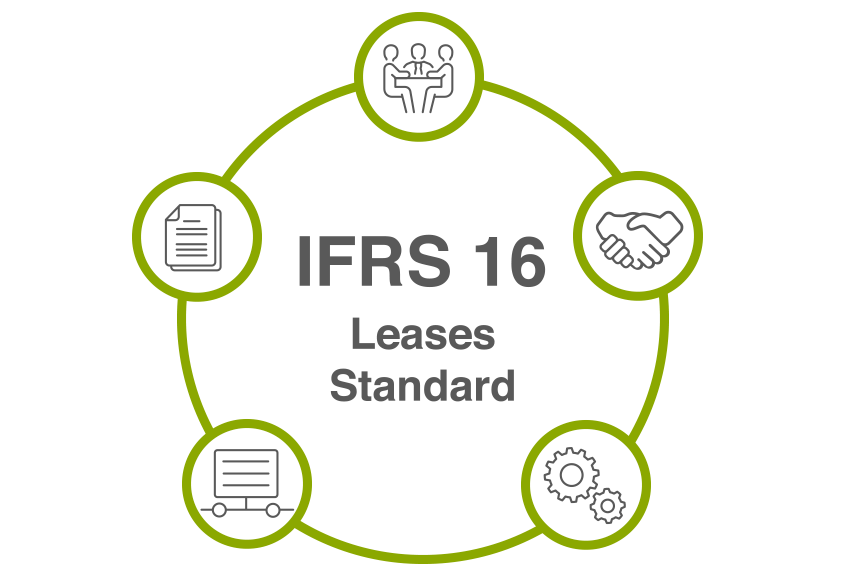How everis helps ease the implications of regulatory compliance for organizations relying on leasing
The new IFRS16 Leases Standard, issued by the International Accounting Standards Board (IASB) in January 2016 in response to concerns about lack of transparency of information about lease obligations, and applicable to reporting periods beginning on or after January 1st, 2019, establishes principles for the recognition, measurement, presentation and disclosure of leases, with the aim of ensuring that lessees and lessors provide relevant information that faithfully represents those transactions.
While leases are currently recognized as either finance leases or operating leases on the balance sheet, IFRS 16 eliminates that distinction and treats them all as finance leases.
Under the new standard, lessor accounting remains largely unchanged. However, the impact on lessee accounting is substantial since they are required to recognize the lease asset (right to use the leased item for the lease term) and the lease liability (obligation to pay rentals) for all leases on the balance sheet, except for exempted short-term leases and low-value asset leases. On the income statement, lessees will recognize the interest cost and the depreciation of the leased asset instead of operating lease expenses.
This will lead to an increase in net debt, higher EBITDA and higher invested capital, thereby lowering ROIC. Additionally, transitional adjustments may consume reserves and also impact distributable profits.
But beyond the financial impact, the transition to IFRS 16 will also have far-reaching effects on an organization’s business processes, systems, controls and workflows. Therefore, lessees will be greatly affected by this new regulatory scenario, while lessors will have to adapt their business models and offerings to market developments as lessees’ needs and behaviors change in relation to leases.

Potential consequences: lease versus buy
But with multiple industry sectors dependent on leasing as a financing solution, transitioning to the new standard is just the tip of the iceberg, since it may require renegotiating loan covenants and impact credit ratings and borrowing costs, in addition to triggering other behavioral changes, such as stakeholder perception.
Lessees that previously recognized their leases as operating leases to avoid incurring large cash outflows at the start are now obliged to recognize all their leases as liabilities. This means that companies with material off-balance sheet lease commitments will encounter significant changes in key financial metrics such as gearing/leverage ratio and profitability.
Since virtually every organization that currently obtains access to assets through rentals and/or leasing is affected by the new standard, the equal on-balance sheet treatment of loan debt and lease liabilities will give them stronger incentives to reassess their “lease versus buy” decisions.
Rising to the compliance challenge
In addition to the transitional challenges inherent to regulatory compliance, the technical requirements of the new lease accounting standard must also be addressed.
This will require a new, cross-functional approach to how organizations manage and report on their leases for compliance that goes beyond accounting, which includes performing an inventory of all their lease agreements and extracting, gathering and analyzing the lease data to fulfill the increased disclosure requirements. This creates significant challenges for many organizations, due to which the transition approach chosen must guarantee efficiency, security and audit traceability.
We accompany organizations across multiple sectors in the transition process.
To this end, we will jointly define and implement a solution using tools that will allow us to automate and control the process. The system to be used by the organization must fulfill a minimum set of requirements and functionalities:
- Powerful calculation engine for generating accounting entries.
- Serve as a repository for electronic copies of lease agreements and their modifications.
- Regulate workflows.
- Enable integration with the other affected processes and systems.
everis, your best technology partner
Our Digital Finance Transformation Unit has a specialized team of professionals dedicated to helping companies transition to IFRS 16 with a holistic, end-to-end vision that involves:
- Gathering the lease agreements and extracting the necessary data.
- Making an initial assessment of the financial and non-financial impact of adaptation to the standard.
- Adapting accounting manuals and policies.
- If necessary, negotiating with suppliers and modifying lease terms to minimize financial impact.
- Evaluating the tool that best adapts to the reality of the organization and their systems architecture.
- Undertaking the implementation and integration of the chosen software.
- Managing change at organizational and process level.
- Establishing controls and procedures to ensure ongoing compliance with the new standard.
Our differential capabilities include:
- Deployment of multidisciplinary teams of financial and IT experts.
- Strong alliances with the providers of the necessary tools and powerful project accelerators.
Obviously, the impact of the new lease standard will depend on the number, volume and complexity of the lessee’s operating leases. Therefore, the availability of lease data will directly affect the costs and timing of the implementation project. In order to guarantee successful adaptation to IFRS 16, we will start by jointly choosing a transition approach and determining the best path forward.
The decisions made at this early stage of the transition process can have far-reaching consequences and significantly impact the lessee’s financial statements for years to come. However, few affected organizations have actually conducted the necessary preparation to enact compliance by adopting the new lease standard that came into force at the start of the year.
Are you ready for IFRS 16?










